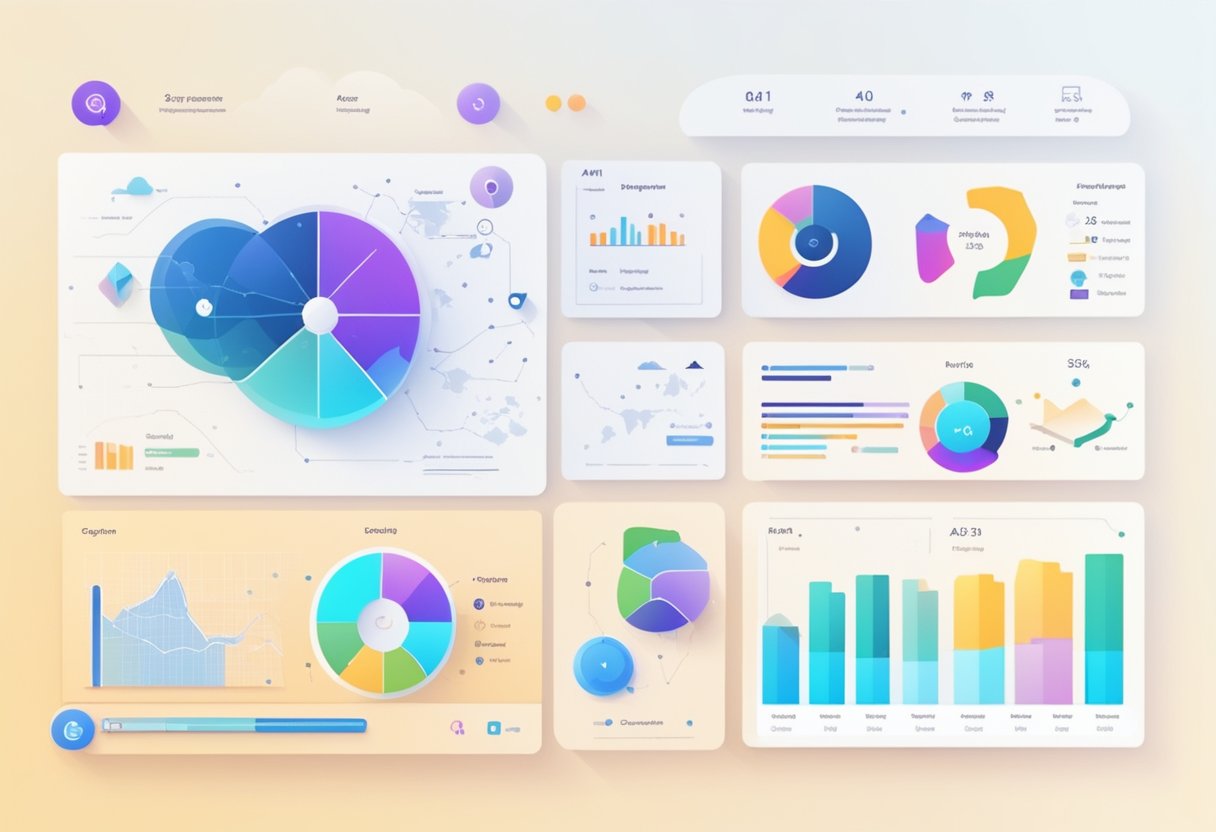AI automation has revolutionized the way businesses gather and analyze customer insights. With the increasing amount of data generated by customers, it has become difficult for companies to manually process it.
AI automation has made it possible for businesses to automate repetitive tasks and process complex data more efficiently. This has led to more accurate and precise insights that can help businesses make data-driven decisions.
Understanding AI in customer insight automation is crucial for businesses that want to stay ahead of the competition.
AI-powered tools can process large volumes of data quickly, giving businesses critical information about their brand, customer care, and competitive analysis in a matter of minutes.
This has enabled businesses to deeply understand their customers’ needs, behaviors, pain points, and preferences. Customer insights can help teams deliver the best products and services to be successful.
Data collection and processing are essential components of AI automation for gathering and analyzing customer insights.
AI tools can greatly enhance a business’s voice of customer analysis, allowing them to process large volumes of data quickly and accurately. Sentiment analysis and customer feedback are other areas where AI automation can help businesses enhance customer experience.
Key Takeaways
- AI automation has revolutionized the way businesses gather and analyze customer insights.
- Data collection and processing are essential components of AI automation for gathering and analyzing customer insights.
- AI automation is the future of data-driven decision-making in businesses.
Understanding AI in Customer Insight Automation

Automating customer data analysis with AI is becoming increasingly popular among businesses. AI and machine learning algorithms can provide valuable insights into customer behavior, preferences, and pain points that can help businesses improve their products and services.
The Role of AI and Machine Learning
AI and machine learning algorithms are used to automate the process of customer data analysis.
These algorithms can analyze large volumes of data and identify patterns and correlations that are not immediately apparent to humans.
The algorithms can then use this information to make predictions about customer behavior and preferences.
One of the biggest advantages of using AI and machine learning in customer data analysis is that it can help businesses identify trends and patterns that they may have otherwise missed.
This can help businesses make more informed decisions about their products and services, and improve customer satisfaction.
Evolution of Customer Data Analysis
Customer data analysis has come a long way over the years. In the past, businesses relied on manual analysis to gather insights about their customers.
This was a time-consuming process that often resulted in incomplete or inaccurate data.
Today, businesses can use AI and machine learning algorithms to automate the process of customer data analysis.
This has made it easier for businesses to gather and analyze customer data, and has led to more accurate and reliable insights.
Data Collection and Processing

Methods of Data Collection
Data collection is the process of gathering information from various sources.
In the context of AI automation for gathering and analyzing customer insights, data collection is a crucial step.
There are several methods of data collection, including online surveys, social media monitoring, customer feedback forms, and more.
One method of data collection that has become increasingly popular is the use of AI-powered tools.
These tools can automatically collect and analyze data from various sources, including social media, websites, and customer feedback forms.
They can also identify patterns and trends in the data, which can be used to improve customer experiences and inform business decisions.
AI-Driven Data Processing Techniques
Once data has been collected, it needs to be processed and analyzed. This is where AI-driven data processing techniques come into play.
These techniques can help businesses make sense of unstructured data and extract valuable insights from it.
One technique that has gained popularity in recent years is natural language processing (NLP).
NLP is a branch of AI that focuses on the interaction between computers and human language.
It can be used to analyze customer feedback and social media posts, identify sentiment, and extract key phrases and topics.
Another technique that is commonly used is machine learning.
Machine learning algorithms can be trained to identify patterns and trends in data, which can be used to make predictions and inform business decisions.
For example, machine learning algorithms can be used to predict customer behavior or identify potential issues before they become major problems.
Analyzing Customer Behavior and Preferences

Understanding customer behavior and preferences is essential for businesses to provide personalized experiences and improve customer satisfaction.
With the help of AI automation, businesses can gather and analyze customer insights to gain valuable information about their customers.
Predictive Analytics and Customer Behavior
Predictive analytics is a powerful tool that uses historical data to make predictions about future customer behavior.
By analyzing customer data such as purchase history, browsing behavior, and social media activity, businesses can predict what their customers are likely to do next.
This information can help businesses tailor their marketing strategies and product offerings to meet their customers’ needs.
Personalization and Customer Preferences
Personalization is becoming increasingly important in today’s marketplace.
Customers expect businesses to offer personalized experiences that cater to their individual needs and preferences.
With the help of AI automation, businesses can collect and analyze customer data to provide personalized recommendations and offers.
By understanding their customers’ preferences, businesses can improve customer satisfaction and loyalty.
Enhancing Customer Experience with AI

Artificial intelligence (AI) has revolutionized the process of gathering and analyzing customer insights. By automating these processes, businesses can gain a deeper understanding of their customers’ needs, behaviors, pain points, and preferences.
This knowledge can then be used to create personalized experiences that enhance customer satisfaction and loyalty.
AI Tools for Improved Engagement
One of the ways AI can enhance customer experience is by improving engagement.
AI-powered chatbots, for example, can provide customers with instant responses to their queries, 24/7.
This means that customers can get the answers they need at any time, without having to wait for a human agent.
Additionally, chatbots can be programmed to provide personalized recommendations based on customer data, improving the overall customer experience.
Another AI tool that can improve engagement is predictive analytics.
By analyzing customer data, businesses can anticipate customer needs, identify patterns, and offer proactive solutions.
For example, if a customer has a history of purchasing a particular product, predictive analytics can suggest related products or services that the customer may be interested in.
This not only enhances the customer experience but can also increase sales.
Real-Time Insights and Personalized Experiences
AI can also provide businesses with real-time insights into customer behavior.
By analyzing customer data in real-time, businesses can identify trends and patterns that can be used to improve the customer experience.
For example, if a customer is struggling to complete a purchase, AI can detect this and offer assistance in real-time.
This can help to reduce shopping cart abandonment rates and improve overall customer satisfaction.
Finally, AI can be used to create personalized experiences for customers.
By analyzing customer data, businesses can create customized product recommendations, personalized marketing messages, and tailored offers.
This not only enhances the customer experience but can also increase customer loyalty and retention.
Sentiment Analysis and Customer Feedback

Gathering customer feedback is crucial for businesses to improve their products and services. However, analyzing large volumes of feedback can be challenging and time-consuming.
This is where AI automation comes in, providing businesses with a faster and more efficient way to analyze customer feedback.
Natural Language Processing in Feedback Analysis
Natural Language Processing (NLP) is a subfield of AI that focuses on the interaction between computers and human language.
NLP can be used to analyze customer feedback and extract valuable insights.
By using NLP algorithms, businesses can identify patterns and trends in customer feedback, allowing them to make data-driven decisions.
NLP algorithms can also be used for sentiment analysis.
Sentiment analysis is the process of identifying and categorizing opinions expressed in a piece of text.
By using sentiment analysis, businesses can quickly identify whether a customer’s feedback is positive, negative, or neutral.
This information can be used to improve products and services and address any issues that customers may have.
Leveraging Customer Reviews and Ratings
Customer reviews and ratings are a valuable source of feedback for businesses. However, analyzing large volumes of reviews and ratings can be a daunting task.
AI automation can be used to analyze customer reviews and ratings and extract valuable insights.
By using AI-powered tools, businesses can quickly identify common themes and issues mentioned in customer reviews.
This information can be used to improve products and services and address any issues that customers may have.
Additionally, businesses can use AI-powered tools to analyze customer ratings and identify areas where they need to improve.
Integration of AI Automation Across Industries

AI automation is rapidly transforming the way businesses operate across various industries. The integration of AI automation has brought about significant improvements in efficiency, productivity, and customer satisfaction.
By leveraging AI automation, businesses can gather and analyze customer insights in real-time, enabling them to make data-driven decisions.
AI in Retail and E-commerce
The retail and e-commerce industries have been transformed by AI automation.
Retailers are using AI-powered chatbots to provide personalized recommendations to customers, enhancing the customer experience.
AI-powered product recommendations have also become a cornerstone in modern e-commerce, streamlining operations and enhancing customer satisfaction.
AI automation is also being used to optimize supply chain management, enabling retailers to make data-driven decisions on inventory management and logistics.
By leveraging AI automation, retailers can forecast demand, optimize inventory levels, and reduce costs.
AI Applications in Healthcare and Manufacturing
AI automation is also being used to transform the healthcare and manufacturing industries.
In healthcare, AI-powered tools are being used to analyze patient data, enabling healthcare providers to make more accurate diagnoses and provide personalized treatment plans.
AI automation is also being used to optimize clinical workflows, reducing administrative tasks and freeing up healthcare providers to focus on patient care.
In manufacturing, AI automation is being used to optimize production processes, reducing costs and improving efficiency.
AI-powered predictive maintenance tools are being used to identify potential equipment failures before they occur, reducing downtime and improving productivity.
AI automation is also being used to optimize supply chain management, enabling manufacturers to make data-driven decisions on inventory management and logistics.
Measuring the Impact of AI on Business Outcomes

As more businesses adopt AI automation for gathering and analyzing customer insights, it becomes increasingly important to measure the impact of AI on business outcomes.
There are several key metrics that can be used to evaluate the effectiveness of AI initiatives, including customer retention, brand loyalty, sales growth, and competitive edge.
Customer Retention and Brand Loyalty
One of the most important ways that AI can impact business outcomes is by improving customer retention and brand loyalty.
By using AI to analyze customer data, businesses can identify patterns and trends that can help them better understand their customers’ needs and preferences.
This, in turn, can help businesses develop more targeted marketing campaigns and improve the overall customer experience.
Sales Growth and Competitive Edge
Another key metric for measuring the impact of AI on business outcomes is sales growth and competitive edge.
By using AI to analyze sales data, businesses can identify opportunities to increase revenue and gain a competitive advantage.
For example, AI can be used to identify cross-selling and upselling opportunities, as well as to identify new markets and customer segments.
In addition to these metrics, ROI is also an important consideration when evaluating the impact of AI on business outcomes.
By calculating the ROI of AI initiatives, businesses can determine whether they are getting a positive return on their investment and adjust their strategies accordingly.
Challenges and Future of AI in Customer Insights

Addressing Privacy and Ethical Concerns
As AI automation becomes more prevalent in gathering and analyzing customer insights, it is important to address privacy and ethical concerns.
One of the main concerns is the collection and use of personal data.
Companies must ensure that they are transparent about what data they are collecting and how it will be used. They must also obtain the necessary consent from customers before collecting their data.
Additionally, companies must ensure that they are using the data in an ethical and responsible manner, and not using it to discriminate against certain groups of people.
Predictions for AI and the Customer Journey
The future of AI in customer insights is promising, with many predictions for how it will improve the customer journey.
One prediction is that AI will be able to provide more personalized experiences for customers.
By analyzing customer data, AI will be able to make recommendations and provide targeted marketing that is tailored to each individual customer.
Another prediction is that AI will be able to anticipate customer needs before they even arise. This will allow companies to be proactive in addressing customer concerns and provide a better overall experience.
As AI continues to evolve, it is important for companies to stay up-to-date with the latest developments and ensure that they are using the technology in an ethical and responsible manner.
By doing so, companies can provide a better customer experience while also protecting customer privacy and data.



